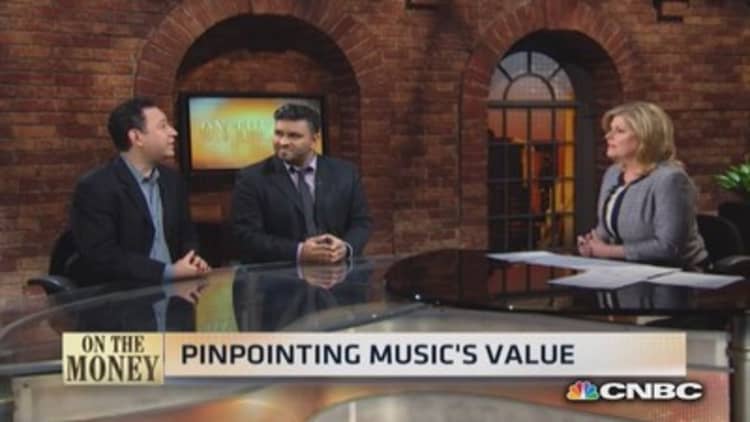
Country star Taylor Swift is typically known for her heartbreak songs, but not this week.
The 24-year-old stood up for the future of music in her op-ed piece for the Wall Street Journal. The songstress said she believes there's still value in albums and people are willing to pay for the ones that "hit them like an arrow through the heart."
For an industry hit by piracy, file sharing and streaming, her essay sparked a big debate among industry insiders about how music can still be profitable in a digital age.
Vox.com Managing Editor Nilay Patel was one not buying it and recently published an article titled "Taylor Swift Doesn't Understand Supply and Demand." What does the highest-earning artist in music not get about the music business?
"I think she's being myopic in the fact that she's an enormous star with an enormous set of relationships and a huge fan base that want to pay her for things," Patel explained. "I think when you have that perspective, you can release anything and people will buy it. If you're a new artist, it's extraordinarily hard to get people to pay attention to you, let alone pay money for albums. And what you're looking at across the industry is that album sales are plummeting because there's an infinite supply of music."
The numbers don't lie. According to the Recording Industry Association of America, music industry revenue totaled $15 billion in 2003 and that figure fell by more than half to only $7 billion by 2013. When looking specifically at the number of albums sold, Nielsen SoundScan reports that the U.S. is selling 30 million fewer albums than just two years ago, now at nearly 121 million albums. This trend is also being seen with U.S. digital album sales, which saw a decline of nearly 16 million to 113 million units in just the last year.
What's keeping the industry barely afloat is music streaming. According to the Nielsen SoundScan 2014 mid-year report, music streaming for the first half of 2014 saw a 42% increase compared to last year, but that growth isn't enough to offset the decline in physical and digital CD sales.
Rolling Stone contributor and former Editor-in-Chief of both VIBE and Spin magazines Alan Light disagrees that it's all doom and gloom for the music biz. One bright spot he points to in the Nielsen SoundScan report is that vinyl sales are up 40% since last year.
"What we've seen is fans will pay for stuff whether it's Jack White's record club or Nine Inch Nails doing limited releases," remarked Light. "Albums at this point need to be souvenirs. They need to be experiental. We see it now with the phenomenon around 'Frozen.' This is selling albums through the roof because kids want to retain that relationship, sing the songs over and over, have that souvenir."
Technology's impact won't stop at just disrupting the music industry's business model. Light reveals you can also expect it to change what you listen to.
"The Shuffle generation is coming of age. You see the DJ Avicii has a huge hit with a country singer," Light said. "Country and hip hop are fusing, and that's what country radio sounds like now. I think we now have kids who've grown up listening to lots of things, and that should be good for where the music itself develops."

